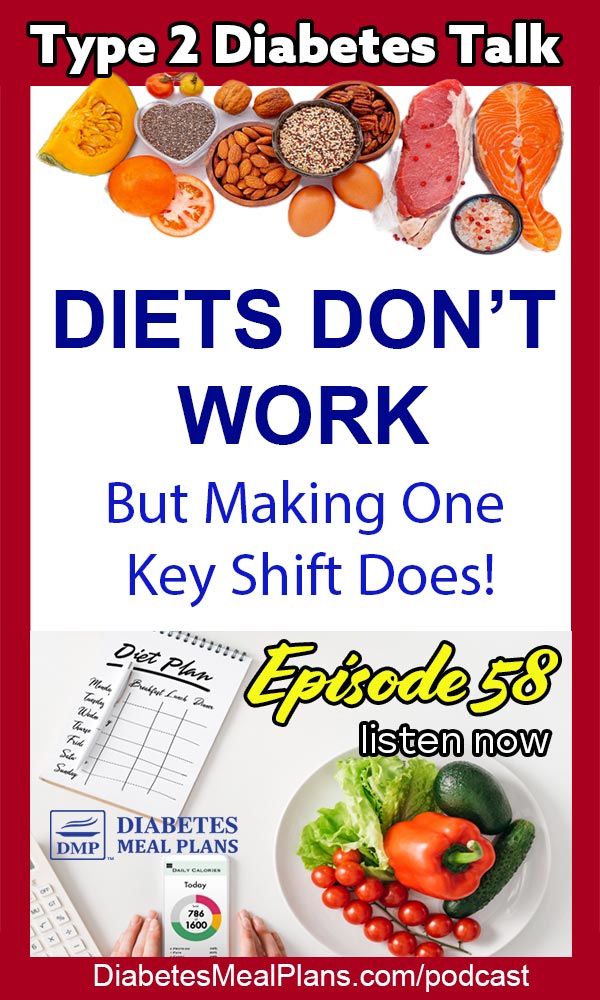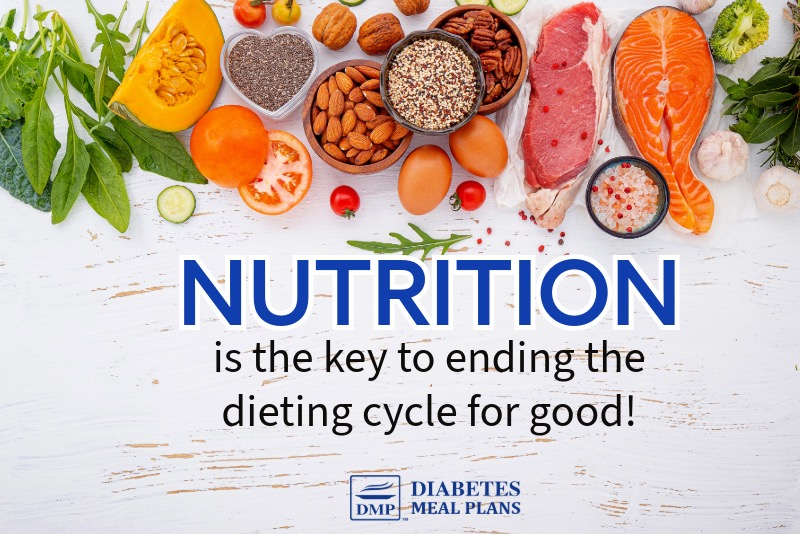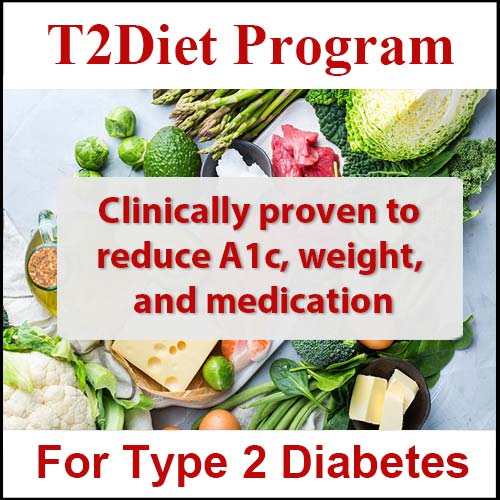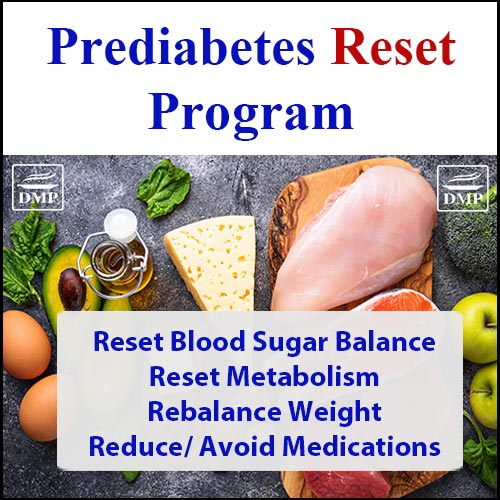In this enlightening and inspiring episode, we delve into the historical evolution of dieting, debunk pervasive myths, and reveal a balanced approach that truly works so you can finally say goodbye to yo-yo dieting and hello to long-lasting health improvements.
LISTEN TO THE PODCAST
CHAPTERS
1:07 Experiences of DMP members
4:50 The history of dieting
6:50 Two pervasive dieting myths
9:43 Why diets don’t work
12:08 Sustainability is a key issue
14:52 Carbs & diet as a dirty word
16:43 Shifting perspective to nutrition
Support the podcast by leaving a 5-star rating and review on Apple, Spotify or our Website – Thank You!
Diets Don’t Work: But Making One Key Shift Does
Have you tried every diet under the sun and been on the dieting merry-go-round for years, perhaps even decades? You’re not alone.
In discussions with various DMP members, a recurring theme is the struggle with “diets” and “dieting.”
For example, Beverly shared how she has lowered her HbA1c by 2.9% and lost 39 pounds (17.9 kilos), something she hadn’t been able to achieve in her 60 years of dieting.
Beverly’s success story is echoed by Lyn, who lowered her A1c by 3.9% and lost 20 pounds (9 kilos), and Wilma, who effortlessly shed 79 pounds (36 kilos)—all of them struggling for decades to get these types of results!
These incredible transformations happened not through fad diets but by making a fundamental shift in their approach to eating.
So, let’s look closer at why diets don’t work and what actually does.
Why Diets Fail
For decades, countless diets have promised revolutionary results. Yet despite all the promises, many people find themselves back at square one, frustrated and demotivated.
Here are some reasons why diets often fail:
- Caloric Restriction: The idea that losing weight is simply about eating fewer calories than you burn is pervasive. While this can lead to short-term weight loss, it often fails in the long term because your body adapts by slowing down your metabolism. This metabolic adaptation means you have to eat even less to continue losing weight, which is unsustainable and unhealthy. In addition, hunger leads to failure of the ‘diet.’
- Fat Myths: The low-fat craze led many to avoid healthy fats, replacing them with high-carb, low-nutrient foods. Healthy fats are essential for satiety (feeling full), hormone production, and overall health. Avoiding fats can lead to increased hunger and cravings, making it harder to maintain the ‘diet.’
- Quick Fixes: Many diets promise rapid weight loss with little effort. These quick fixes often produce temporary results due to severe calorie restriction or water loss, but they are not sustainable. Once the diet ends, the weight typically returns, often with a few extra pounds.
- Psychological Deprivation: Dieting can lead to a sense of psychological deprivation, which often manifests as emotional and binge eating. This is obviously counterproductive and not healthy and highlights the importance of finding a sustainable approach to eating that allows for flexibility and promotes both physical and mental well-being.

Making One Key Shift For Permanent Weight Loss and Health Improvements
If you’re tired of the dieting cycle, struggling with yo-yo dieting, or seeking better health outcomes, it’s time to make one key shift.
The key shift that does work is focusing on NUTRITION!

Instead of following another restrictive diet, prioritize nourishing your body with quality, nutritious foods. This approach leads to sustainable weight loss and permanent health improvements, as evidenced by our community members like Lyn, Wilma, Helen, and Beverly.
Lyn shared that the program taught her so much and changed her eating habits dramatically. She now views her new way of eating as a permanent lifestyle change.
Wilma, questioned by her doctor about the sustainability of her results, confidently stated that she has never felt so good.
Beverley now understands how foods influence her body and naturally chooses healthier options.
Helen sees our approach as a safe food space that has finally helped her successfully lose weight and feel better.
Our program’s success isn’t by chance. Over the past decade, we’ve learned what works for our community by focusing on their needs and developing practical resources to support their health journeys.
Our T2Diet Program, developed with input from people across four stages and scientifically proven in a randomized controlled trial, emphasizes flexibility, practical resources, and delicious recipes to ensure sustainability.
Focusing on nutrition rather than dieting builds confidence and a sense of empowerment. It helps you understand what to eat to treat diabetes and achieve sustainable results. This shift from dieting to nutrition is not just about losing weight; it’s about adopting a lifestyle that supports your overall health and well-being.
The key point is: Focus on nutrition, and you’ll start to see a positive change in all aspects of your health and life.
7 Steps To Stop Dieting Today
Here’s a few steps to shift out of the “dieting” mindset and into a nutrition-focused mindset:
- Understand Carbohydrates: Carbohydrates have the greatest influence on blood sugar levels. By focusing on low carb nutrition, you can better manage your blood sugar, support sustainable weight loss, and reduce and stop medications too. Choose whole, unprocessed carbohydrates such as vegetables, berries, beans and legumes
- Include Healthy Fats: Don’t shy away from fats. Healthy fats, such as those found in avocados, nuts, seeds, and olive oil, are crucial for satiety and overall health. They help keep you feeling full and satisfied, reducing the likelihood of overeating.
- Prioritize Protein: Protein is essential for maintaining muscle mass and cellular metabolic functions. It also helps keep you feeling full. Include lean proteins such as chicken, fish, tofu, and legumes in your meals.
- Focus on Whole Foods: Avoid processed and packaged foods as much as possible and base your meals around whole, unprocessed foods. These are naturally nutrient-dense and free from added sugars and unhealthy fats. Fresh vegetables, low-sugar fruits, proteins, and healthy fats should be the foundation of your diet.
- Stay Hydrated: Drinking plenty of water is crucial for overall health and can help control hunger, along with regulating blood sugar levels. Sometimes, thirst is mistaken for hunger, leading to unnecessary snacking.
- Mindful Eating: Pay attention to your body’s hunger and fullness cues. Eat slowly and savor your meals. This can help prevent overeating and promote a healthier relationship with food.
- Meal Planning: Plan your meals and snacks ahead of time. This helps ensure you have nutritious options available and reduces the temptation to reach for unhealthy foods. Or, use a meal planning service like we provide here at DMP – it helps make all this nutrition and eating stuff much easier!
For more food detail, grab a free copy of our recommended food list. This list includes key foods to eat, minimize or avoid, helping you take the right steps to end the dieting cycle once and for all!
Transcript
Click Here To View
Dr. Jedha, Host, 01:07
Hello wonderful people, welcome to episode 58.
I’ve spoken to numerous DMP members recently about their health journeys, and while I was doing so a common theme kept arising, the fact that diets don’t work.
For example, Beverly shared with me how she has lowered her HbA1c by 2.9% and lost 39 pounds (17.9 kilos), something she hasn’t been able to do, ever. She shared how she’d tried every diet under the sun and had been on the merry-go-round for 60 years, since her 20’s – she’s 80 now and in the best health she’s ever been.
Lyn has lowered her A1c by 3.9% and lost 20 pounds (9 kilo). She said, and I quote: “I am extremely happy with these results as I’ve tried and failed so many times to achieve these types of results.”
As we’ve heard from Wilma in previous episodes 7 and 36 – weight was always an issue for her but she could never seem to lose it. Now she’s lost a whopping 79 pounds (36 kilos) and she’s done it effortlessly, without even thinking about it at all.
In episode 40, Helen shared how she’d tried every diet and felt like it was the dieting mentality that got her to 340 pounds (154 kilos). She has now lost weight and is going strong.
When we asked Joyce recently how she was doing, she said, and I quote: “Truthfully, I haven’t even started anything yet. Things are somewhat up in the air right now. I guess that when I’ve done nothing but diet my whole life, even when I wasn’t heavy or a diabetic person, it just gets tiring. Today is not the day I can really feel like starting something new.”
These are just a few examples behind the inspiration of today’s episode, a topic that I feel resonates with so many people: the frustration and struggle with this whole “dieting” thing and yes I say “dieting” with air quotes to emphasize it.
For years, often decades, many in our community have tirelessly followed various diets, hoping for significant weight loss or improvements in their diabetes management, only to find themselves back at square one. Like Joyce shared, this can be really disheartening, demotivating and can make you feel like lasting change is out of reach.
By the end of this episode, you’ll understand that success is certainly not out of reach. I’ve already demonstrated this by the stories I just shared about Lyn, Beverley, Helen and Wilma – all losing significant amounts of weight.
Today, not only will we dive into some of the reasons why diets often fail but to share that there is a path to sustainable weight loss and improved diabetes management, and it doesn’t involve another fad diet. It’s how Lyn, Beverley, Helen, Wilma and many others in the DMP community have achieved their great weight loss and health results and are now living life in a completely new and energized way.
04:50
So where on earth did this whole dieting thing begin?
The concept of dieting has roots that stretch back centuries, but it began to take shape in a more modern sense in the 19th and early 20th centuries. One of the earliest recorded diets was prescribed by William Banting, an English undertaker, in the 1860s. The banting diet recommended avoiding sugar, starch, beer, and dairy, essentially promoting what we now recognize as a low carbohydrate diet.
The early 20th century saw the rise of calorie counting for weight loss. This era marked the beginning of the obsession with caloric intake and portion control. The mid-20th century brought further developments, such as the low-fat craze that began in the 1950s, spurred by studies linking dietary fat to heart disease, none of which were actually valid but in any case, that’s where the low-fat craze came along. This period also saw the popularity of the grapefruit diet and the cabbage soup diet, among many other fad diets that have been and gone.
Without a doubt, over the years, we’ve seen a plethora of popular diets emerge and they still keep popping up every day, each promising revolutionary results beyond all others – Low Fat Diets, Low Calorie Diets, Atkins, South Beach, Paleo, Keto, Carnivore, 5:2 Fast Diet, Blood Type Diets, Shake Diets, Detox Diets and the list goes on. We latch onto these shiny objects hoping ‘this’ will be the diet solution I’m looking for. This will finally be the diet that will lower my blood sugar and move this stubborn weight. But for many, that’s not the case.
06:50
When it comes to dieting, there are countless myths that have persisted over the years, two in particular are calorie restriction and eating low fat diets.
One of the most pervasive myths is that losing weight is simply a matter of eating fewer calories than you burn – this is the Energy Balance Model we spoke about in episode 12. This myth of eating less calories than you burn is still pervasive to this day. While calorie restriction can lead to short-term weight loss, it often fails in the long term – people end up putting the weight back on, we’ve seen it time and time again. You see, the body is incredibly adaptive and when you drastically cut calories, your metabolism slows down to conserve energy. This metabolic adaptation means that over time, you have to eat even less to continue losing weight, which is neither sustainable nor healthy.
Another popular myth is that all fats are bad and should be minimized to lose weight and improve health. The low-fat craze of the 1980s and 1990s led many to avoid healthy fats, replacing them with high-carb, low-nutrient foods. This shift has been completely counterproductive to good health and has led to increasing rates of obesity and diabetes. Healthy fats are essential for satiety, hormone production, and overall health. Yet, the idea that low-fat diets are universally beneficial persists, despite mounting evidence to the contrary.
We’ve all seen the advertisements promising rapid weight loss with little effort – from miracle supplements to extreme detox diets. These quick fixes often produce temporary results due to severe calorie restriction or water loss, but they are not sustainable. And one other problematic thing is once the diet ends, the weight typically returns, often with a few extra pounds.
We often see these myths persisting due to persuasive marketing, and of course, in our modern fast-paced world, quick fix solutions can seem incredibly appealing. We only have to think of the new weight loss drugs taking the world by storm. Of course, a quick fix may seem like an ideal solution, but even with drugs there are potentially significant side effects and there is weight gain if medications are stopped.
Coming back to these diet myths, there are scientific reasons why diets often fail to produce lasting results. As mentioned earlier, when you significantly reduce your calorie intake, your body responds by slowing down your metabolism. This process, known as metabolic adaptation, is the body’s way of conserving energy in response to perceived starvation. Over time, this can make weight loss increasingly difficult and weight regain more likely once normal eating patterns resume.
Diets often involve restrictive eating, which can lead to persistent hunger and cravings. When you’re constantly hungry, it’s challenging to maintain willpower and stick to the diet. This is especially true if the diet is low in protein and healthy fats, both of which help to keep you feeling full and satisfied.
Restrictive diets may lead to nutrient deficiencies, which can negatively impact overall health and well-being. For example, very low-fat diets can deprive the body of essential fatty acids and fat-soluble vitamins, while very low-calorie diets can lack sufficient vitamins, minerals, and macronutrients needed for optimal health.
Perhaps the most significant issue with most diets is their lack of sustainability. Extreme restrictions are hard to maintain in the long run, leading to a cycle of yo-yo dieting. This cycle not only undermines physical health but can also affect mental health, leading to feelings of failure and a negative relationship with food.
This issue with sustainability also applies to some popularized diets or diet practices such as keto diets, 5:2 diets and even various types of fasting. In studies we see these diets and dietary practices being effective, that’s true and if they work for you that’s great. But one of the difficulties again is sustainability. Research frequently shows adherence to restrictive diets is poor, and long term sustainability is an issue. In my experience and from speaking to many members, it is frequently the case as well. I understand why this is and I’m sure you can relate.
We live in the real world, and for most people, engaging in normal life is still important. Taking on extremes is usually not suited to most people. Sure it may work for some, but for most it doesn’t. As Helen shared in episode 40, her experience was that eating 800 calories a day or 300 calories a day was certainly not sustainable. Helen emphasized that the constant promotion of unsustainable lifestyles is ludicrous and has not helped her overcome her years of struggles with weight gain. I certainly agree and the approach we take is one of sustainability because not only do we want you to get great results but also to sustain them. We don’t want you to simply do another diet, but to take on a new way of eating and a lifestyle that feels natural and sustainable to you because that’s how you’ll best manage your diabetes and health long term.
Another thing is that, in many cases, dieting can lead to a sense of psychological deprivation, which often manifests as emotional and binge eating. That’s not what you want at all. This again highlights the importance of finding a sustainable approach to eating that allows for flexibility, helping to promote both physical and mental well-being.
If you’ve been listening to the podcast a while or you’re one of our members, you’ll know that we do encourage a lower carbohydrate diet, or rather lower carbohydrate nutrition. Carbohydrates are important because they have the greatest influence on blood sugar levels, but also because they influence key hormones in the body that make it harder to lose weight and increase insulin resistance, making it more difficult to regulate blood sugar. We’ve covered topics like this in episode 12 where we focused on smarter weight loss with the Carbohydrate-Insulin Model and on insulin resistance in episode 26. Carbohydrates are an important focus on diabetes treatment but carbs are not the enemy so to speak, as there are lots of healthy and beneficial carbohydrate foods.
I prefer the word nutrition because the word diet is a bit of a dirty word. Your ‘diet’ is simply the way you eat on a daily basis. And that’s where nutrition is key. Instead of dieting, when you focus on nutrition, focus on taking care of yourself, understanding different aspects of your health and learning how to nurture your body with quality nutritious foods, things change from the inside out. In a literal sense, because your body’s cells are now being nourished with the vitamins, minerals and fuel they really need. But also from an internal sense of mental and emotional wellbeing. Focusing on nutrition builds a sense of confidence that you know what to eat to treat diabetes, a sense of empowerment because you’ve finally seen the results you want and since you’re doing that, you’ve developed a sustainable approach that you can follow for a lifetime, and you’ve found a clear pathway that can lead to sustainable results.
For instance, let’s come back to the people we talked about at the beginning – Lyn, Wilma, Helen, Beverley – they’ve all found our nutrition approach sustainable.
Lyn said and I quote: “The program has taught me so much and the food and your approach to it has made all the difference. My eating habits have changed dramatically. This, to me, is not just a diet and I’m sure it’s a permanent change and way of life for me in the future.”
Wilma keeps getting questioned by her doctor about whether her “diet” and results are sustainable. She says they certainly are because she’s never felt so good, she’s wearing swimsuits and clothes she hasn’t been able to wear in decades, she’s not embarrassed to attend family events and be included in photos, and it’s all because she now knows the foods that support optimal health for her body. She’s simply focused on nutrition and the benefits have been profound.
Beverley shared that she now has a deeper understanding of how foods influence her body and never chooses foods she would have eaten all the time before. It’s just become second nature.
Helen shared how she sees our approach as a safe food space that provides support. It’s an approach that’s finally helped her become engaged with her health to successfully lose weight and feel better in life.
It’s not by chance that our program works. Over the past decade, we’ve learned what works for our community because we’ve been focused on answering their questions and developing the practical resources they needed to make the changes they wanted.
In addition to the length of experience we’ve had at DMP, I also led world-first multiphase research on digital nutrition programs for type 2 diabetes. The T2Diet Program was designed with people, by getting their feedback and input across four stages during development, so we really had an even deeper insight into what would help people achieve and sustain their health improvements.
Having access to relevant web-based resources they could trust and access on-demand when they needed to. Being communicated to in a respectful, positive way that’s easy to understand. Practical resources that account for juggling life commitments, which we all have. Delicious recipes, of course, so as not to fall into a rut routine and get sick of eating the same old stuff. Supporting people to eat no matter what environment you’re in—workplaces, traveling, restaurants, cafes, fast food outlets, family, and social occasions, places where healthy eating can be more challenging. And most importantly, flexibility in the guidelines to be realistic enough to be followed. All of these things are embedded in our programs.
One person in the study said, and I quote this from the published manuscript: “I’d just like to say, um, I like the very opening where you say look, um, just keep an eye on the carbs but don’t get sort of hung up on the details, you know, you can eat until you’re full, things like that. Very often, you get very strict regimes, you know, where people really almost tell you off, and then go on to a very excessive sort of diet proposal, when I suppose, I switch off because, I think to myself, well, that’s a bit too abnormal.”
This person is talking about the topic of today: that diets don’t work – very strict regimes, excessive diet proposals, eating habits that are too abnormal – they’re just fad diets and the overwhelming evidence suggests – they do not work!
In contrast, and I know I’m a bit biased here, but our programs are incredible, and each story I share on this podcast, real life stories of our members, these stories are a testament to the power of our flexible and sustainable nutrition approach.
The key is combining quality nutrition with ongoing support because when you do that, no goal is too difficult to achieve. That’s certainly what’s helped many of our members. Having the ongoing nutrition education and countless resources at their fingertips and the ongoing support to maintain focus and motivation. If you’re not a member already, we’d of course love to have you join us.
In any case, diets don’t work. So if you’re stuck, struggling, in a yo-yo dieting cycle, want to achieve better results, or feel sick and tired of dieting, then it’s time to stop. Diets don’t work: Nutrition is key to better health. Use nutrition as your new focus and things will start to look different for you in all aspects of your life.
So I guess the key thing I hope you will take away from today’s episode is that there is hope you can get out of that horrible dieting cycle, like Lyn, Wilma, Beverley, and Helen have. All you have to do is start your nutrition journey today so let us help you do that, head down here to and grab a free copy of our recommended food list.
Keep taking those steps towards a healthier life.
Dr Jedha, over and out.
Subscribe to Type 2 Diabetes Talk on: Apple | Spotify | Amazon Music | Audible | YouTube | Podcast Index | Player FM | and more…




Leave a Reply